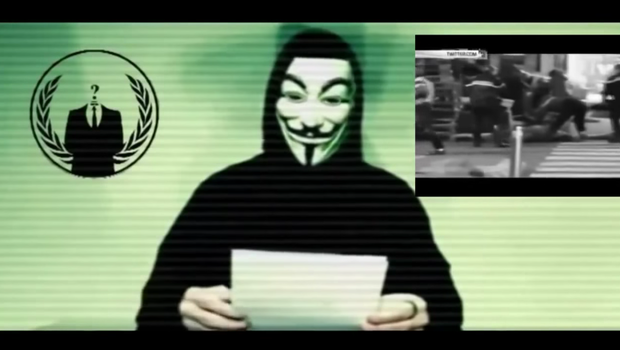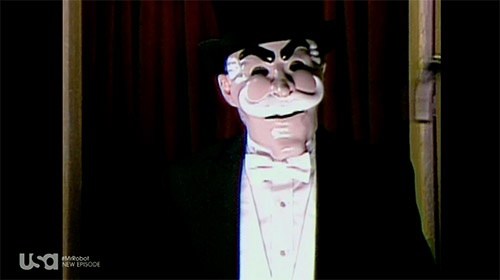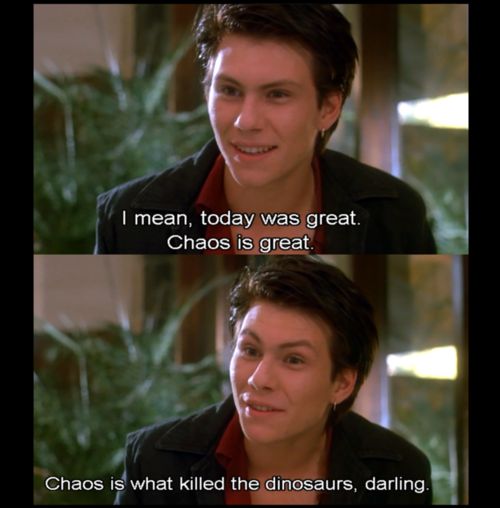
WARNING: THIS ARTICLE HAS SPOILERS (in red). DISCLAIMER: While there is no full-frontal nudity in the show, I would say that the sexual content is explicit (clearly depicts hetero- and homosexual activity).
“If you erase the debt record, then we all go back to zero.”
Pop quiz: What movie or TV show is this quote from?
Answer: The same one where the main character gets involved more and more deeply with a fanatical terrorist in a plot to bring down modern society as we know it, unaware that it is really his alter ego carrying out his subconscious desire to destabilize.
Aside from its obvious shared themes, quotes, and plot with Fight Club, USA Network’s Mr. Robot adopts a similarly wry and dismal tone. In both works, immediately we’ve seen through society’s relentless consumerism and profiteering, along with all cheerfulness, laughter, and any hint of the color orange. Clearly, both protagonists have also seen through the Fourth Wall—as well as all need to inflect.
Here at Modern Life survivalist we like to discuss movies and TV shows when they touch on subjects that fit the theme of our site. This show in particular is quite relevant to surviving Modern Life, and a review of it should complement our coverage of cyber security, privacy issues/whistleblowers, and globalism. This gets into some complex thoughts about the state of world affairs, far beyond what you’ll see on Fox and CNN, so I hope it doesn’t throw you for a loop. In other words, bear with us, and I think it will be worth it for you to consider the things I’m discussing here.
The Gist of the Show
In Mr. Robot, we join an enlightened, young, drug-addicted hacker, who also happens to be quite talented and successful in his career as an IT cybersecurity specialist. I suppose we are to look past his success and understand his pain, even though he has seemingly random women bringing him free “molly” (drugs) in the middle of the night that offer themselves to him presumably after they get high together. Despite my best intentions, I ultimately buy his pain, and despite moral qualms with watching sexually explicit shows, I’m hooked within the first few minutes. You see, Mr. Robot is centered around one of my favorite topics—conspiracies.
Early on in Mr. Robot, we are given a refreshing montage explaining what Elliott, our anti-hero of inscrutable ethnic descent, thinks of society. “[Eff] society,” he projects to his therapist from his subconscious, then uploads in her direction a streaming montage overdubbed with narration bemoaning how the universally lionized Steve Jobs made his money off of the sweat of third-world children (in sweatshops). This seems kind of edgy, because not until recently has there been much skepticism about the unquestioned praise thrust onto Jobs since his death—but is it really that edgy? Sweatshops and children starving in China are kind of old hat; I mean since the Eighties, which happen to be a stylistic reference point for the show, hasn’t this been a regular topic for films and daily conversation?
Other than that, though, (not that sweatshops is something to pshh off…) it was an exciting moment in the show for “truthers.” Elliott’s vision projection to his therapist flashes things about consumerism and the U.S. that we all (are supposed to) hate, such as Black Friday signs, Facebook updates (my personal favorite), and Hunger Games books. Wait—do truthers hate Hunger Games? I don’t.
Actually, now that I’m rewatching this scene, I could have sworn that he said something about the Federal Reserve. Let me look it up while you check out the clip I mentioned…
*Phew* Okay, I didn’t imagine it. It wasn’t in that clip. But later in the show (I think in Episode 2 or something), Mr. Robot (Christian Slater’s character) says, “Money hasn’t been real since we got off the gold standard. It’s become virtual software. The operating system of our world. And we are on the verge of taking down this virtual reality.” So this implies Federal Reserve at least. In any case, we’re given more truth about the reality of this world in that line than I believe I’ve yet seen in mainstream entertainment. Here’s an article talking specifically about the veracity of MR’s claim.
But still, I call shenanigans and say Mr. Robot is astroturf cointel. At the very least it is a distraction (keeping you entertained essentially). Going further, it is probably actually a subversion and distortion of real knowledge that could be found from half the semi–well-made homespun documentaries on the matter from YouTube. Beyond that, Mr. Robot may even be a call to an all-out cyberterrorist revolution, for whoever might pay attention and copy the things it suggests.
Normalization Makes You Forget to Pay Attention
Some might argue that a show like Mr. Robot could be a positive catalyst for the unitiated into a deeper pursuit of this knowledge. Sometimes this happens, but in some ways not so much. For instance, I haven’t seen that many Muse fans look further into globalism. When people have no knowledge base for a particular topic, they can easily make one of two mistakes in their first exposure: 1) Everything they learn will be the primer upon which they compare all future learned facts on the topic; or 2) They will always have it as fictitious reference point when someone starts to talk about these things. It is almost a form of hypnotism, as it involves a “trigger” word, and a “conditioned response.” Like someone hears the phrase “fractured soul,” and they instantly say, “you mean like hoarcruxes in Harry Potter?”
Also, related to complication #2, you come across the problem with the media shifting the Overton window. People essentially become more “accepting” of things that are unacceptable and should stir outrage. This even happens with the news (which is more arguably more “real”) and how they decide what to report. Slowly, over the years, things get more and more outrageous (even though the most outrageous things have already occurred in secret and just aren’t being let out). The mind reacts to facts like violent images or pornography. You just get progressively desensitized and accept awful things more and more readily.
Before I continue in my criticism, let me just say that I have no love for the “Evil Corps” (the nickname characters in MR use for the fictitious E Corporation) of our world, and I do want them to be taken down a notch (or ten) in one way or another. However, I believe that awareness, prayer, legal political action, and peaceful resistance are the real way to go about resisting. I have said before that I am a fan of the Tea Party movement, Ron & Rand Paul, whistleblowers like William Binney and Edward Snowden, and alternative media pundits like Alex Jones. They fight tyranny by raising awareness in a very blatant forum that shines a bright scalding light of truth on the scum in the darkness.
Mr. Robot, at least on the surface, advocates a more penetrative and active form of rebellion, which has its merits in its own right. My concern is that it spurs on action in a very specific way, which may indicate there is a possibly bankrolled hidden agenda of destabilization extremely reminiscent of other youth-run movements in the past decade. Please allow me to elaborate.
Occupy Mr. Robot
I believe Mr. Robot employs a similar tactic of desensitization and distortion as Fight Club in its treatment of the concepts of resistance to authority and tyranny. Such irresponsible treatment of this delicate subject accomplishes two goals for the establishment who might be resisted by those the films claim to be marketed towards:
- It makes anyone who resists look like a whiner, hipster ingrate who has nothing better to do.
- It encourages people to resist in useless ways, focusing on the wrong things—but if there are useful ways that are shown, there is some crucial part of the story or technique that is missing, which without it would make the whole movement utterly ineffectual.
Mr. Robot seems to occupy the same territory as the Occupy movement, which also incidentally, being a movement almost exclusively based on theater and evaporative rhetoric, seems to have accomplished these two goals. Once it comes close to being profound, the distraction of the players gets in the way of really accomplishing anything. The major motivation of MR’s main character, Elliott, really just seems to be to erase his and his love interests’ student loans. One can’t help but relate this directly to the college students huddled together on Wall Street, shivering and shirking their classes and exams. This after putting together that they had this much student loan debt ahead of them and this little likelihood of paying it off in the next decade, even if they were to go on to get a decent job with that liberal arts degree in Women’s studies.
 Pic from The Guardian
Pic from The Guardian
While I am able to see the evil inherent in a government that creates currency by fiat, I have trouble empathizing with people who have gigantic student loans. I did not choose that road, got through college (mostly) on a full scholarship, and I ultimately became a business man. People should think of college as an investment. If you have something in mind that will definitely make money, then pursue an education according to a plan that results in making money. Every young person should be taught to think like this.
Anonymous also comes to mind a lot when watching this show. It even prominently displays in the opening credits, “In Association with Universal Cable Productions and Anonymous Content.” Whether this distribution company has been around awhile or not, this is obvious branding. I know it gets me thinking about Guy Fawkes right away. The little vignettes of Mr. Robot in a mask making demands on the nightly news also evoke Anonymous and their mascot. Mr. Robot reminds me more of Pennybags or Mario, though.

Guy Fawes, coopted from V for Vendetta, speaking for Anonymous

Mr. Robot delivering an “anonymous message” for fsociety

Rich Uncle Pennybags from Monopoly: “You’ve won First Prize in a beauty contest!”
Other examples of Anonymous references in Mr. Robot:
- Uh, well the main character is trying to “change the world” through hacktivism
- The mission statement of Anonymous is… well, what is it? In any case, sometimes they just do things “for the lulz.” From Amazon Instant Video episode descriptions, which utilize IRC-esque “hacker speak:”
‘eps1.2_d3bug.mkv <mr.rob0t> elliot tries to lead normal life – but pulled back into fsociety. gideon gets suspicious. tyrell plays dirty @ evil corp. I did it 4 the lulz.’
- In the first scene, Elliott confronts and then “takes down” a child pornographer he’s been hacking. Anonymous has been known to do this type of thing.
- Douchy womanizing white males are targeted by Elliott (particularly his therapist’s married boyfriend); whereas Anonymous has taken an active stand against “rape culture.”
- Speaking of unfaithful men (and women), the most astounding (and suspicious) coincidence: In one episode, an “Ashley Madison” (affair site) file dump is mentioned. This happened one week before an actual real-life hack of the self-same website occurred, ruining countless lives (but also helping countless others)
Are Anonymous and Occupy Astroturf?
I honestly don’t know what to think of the real-life Anonymous. They’ve been around for, oh I dunno, 5 years now? What have they accomplished? Are they legit? Just like Occupy, I wonder if they’re astroturf. There is this amazing article relating how the Occupy movement is an American rehash of Arab Spring, which was a time in recent history when several Middle Eastern countries had regime changes that resulted from the efforts of, according to mainstream media, “spontaneous grassroots uprisings.” You have probably heard from the news that “All of them had a very active social networking component, most notoriously the use of Twitter to organize the uprisings.
Essentially, the Bill Noxid piece I mentioned above goes point by point explaining why it is very unlikely that Arab Spring was a leaderless movement. The author has some very interesting ideas on other topics, insisting that Obama is a sincere dude—but other than that I think he has most of this stuff right. He describes how these Twitter accounts and websites popped up out of nowhere and began disseminating very effective information from U.S. government manuals and documents on how to carry out both organized civilian revolts and cyber terrorism. It was all prepackaged and perfect, and the timing was very conspicuous. It was always way before the election was over when these handles tweeted unverifiable things about the election being rigged or a coup d’etat.
From reading each tweet from the first Arab Spring revolt, I also couldn’t help but notice how the Twitter accounts providing proxies and intel on how to carry out DDoS attacks were baiting hackers by saying things like, “Are you a PHP master? Want to help? E-mail php@austinheap.com! #Iran #IranElection.” Seeing this tweet made me start to understand why we should question the validity of the movement. You see, most hackers, from what we’d understand, will hack anyone (just like Elliott does in Mr. Robot) “just for the lulz.” Of course hackers would want to flex their skillz for a good cause if the chance arose. Who doesn’t want to change the world?
So how does Arab Spring relate to Occupy? The author discusses the call-to-action website for when Occupy first got together. It was originally called “Day of Rage,” (it’s down now, but here’s a site that links to it) which shared a name with the Iran revolution, and a planned Weathermen (Bill Ayers–run violent communist revolutionary organization from the Sixties) event that urged people to “kill your parents.” Freaky. Day of Rage incidentally happened to be bankrolled and organized by one Stephen Lerner, and supposedly even connects back to George Soros. (This would certainly make the original intent extremely suspect.)
However, the original materials provided as the Occupy movement was forming show a similar prepackaged bunch of information as the Arab Spring, involving tactical manuals on how to protest effectively and tips on how to avoid being surveilled. No information was provided on how to carry out DDoS attacks however, unlike Arab Spring materials.
Winding Up Mr. Robot
If we are to examine the recurring themes behind the real-life movements upon which Mr. Robot is based, we can find a fairly common thread. If some group was behind Anonymous, Occupy, and Arab Spring, their technique for mobilizing involved specific evocative rhetoric along with the employment of social networks to spread awareness, stir up, train, organize, and carry out these activities. See if you can keep up while I sew this together.
The Anonymous/Occupy connection is clear:
- Mr. Robot is a show about Elliott, an IT worker with massive student debt who blames his ills and all ills of the world mostly on one corporation. Occupy is anti-corporation and seems to play on the anxiety of young student debt slaves, mostly targetting Wall Street and big corporations.
- Elliott has a hidden identity, complete with super powers (his hacking ability). He is a hacker by night, who carries out anonymous hacks “for the lulz,” both against individuals and corporations (as well as the entire System) that he deems to be evil. Anonymous carries out a similarly vigilante agenda, causing mischief for social justice.
Mr. Robot is a technical manual for a cyber revolution:
- Very specific technical information, as well as specific tactics for carrying them out in real-life, is given in Mr. Robot, such as:
- how to hack/phish for people’s personal passwords
- how to infiltrate police station networks
- how to (vaguely) carry out an all-out prison break
- how to infiltrate someone’s personal computer by tricking them to “buy your new CD”
- how to gain access to someone’s information by borrowing their phone
- how to get a raise at a cyber security company and “stopping the hack”
- various vague ideas on how to bring down a large corporation by infiltrating their climate control, their backup data center, and/or blowing up power plants near their headquarters
- how to destroy someone’s career by implicating them in a massive security breach on their own company
- how to carry out corporate espionage and gain leverage (the villain does this) by seducing men just to gain access to their phone
- (On a side note) how to take the street drug “molly” without getting addicted, as well as how to avoid withdrawal if you do
- Elliott starts fsociety, a hacker terrorist group with the express goal of taking out the biggest corporation in the world. Their goal is to erase all debt and bring down capitalism.

As Theorized for Arab Spring, Occupy, and Anonymous…
Mr. Robot could be a call to action to bring down Capitalism, essentially “phishing” for talented hackers who might carry out their goals of destabilization. In the execution of what borders on Jacobin activist propaganda, the show gives technical information, purportedly gained through the research of the series creator, Sam Esmail. This is very reminiscent of what may have been the genesis of Occupy, Anonymous, and Arab Spring. Someone “wound up” these guys and just let them do their thing.
I’m going to step a little further out there and say, this is programming and activation to a greater degree than television has yet attempted. Metal Gear Solid 2 is a video game from 2002 that discusses the subject of memes to a surprising extent, way before the term became as popular as it is today.

In that story, memes are actually slated to surpass the influence of genes on the future. What we’re seeing in Mr. Robot is a targetted perpetuation of a meme, and real-life hackers, who seem to be more susceptible and suggestible because they’re so plugged in all the time, seem to be imitating the technically sophisticated memes presented in Mr. Robot. The origin of that meme was the hackers themselves. Life imitating life imitating art I suppose. As we’ve discussed, there have already been staggeringly close parallels in the news to events in certain episodes, such as the Ashley Madison dump, almost as if they’re done by “copycats” who are fans of the show. We are possibly starting to see real results from this psy-op.
The creator is aware of these parallels, but he kind of brushes aside the oddness of this synchronicity. I believe it is quite possible that there really is insidious suggestion behind this show (probably carrying out the agenda of executives much higher up). People do specifically copy movies and music that they consume, but there is very little out there that is as specific as Mr. Robot on how to conduct a covert cyber terrorism operation. Either this is very irresponsible, or it is intentional.
Conclusion
Just to be clear, I do believe the movements Occupy, Anonymous, and Arab Spring comprise up to 90-95% talented individuals with great intentions, not affected by the ulterior motives of their progenitors. My hats off to you guys, especially for your work in fighting sex trafficking, rapists, and other criminals. This is the kind of work that I can’t argue needs to copied by a lot of skilled hactivists.
Just really check your motives when you start thinking about an all-out war against corporations. Exposing the evils of a company (or why not target the Federal Reserve for that matter) by data extrication is one thing. An all-out takedown in order to destabilize society will only give opportunity for a World Government to come in and take over with a more totalitarian system than you’ve ever known. But that’s another topic altogether.
Bonus Thoughts
#1: The show seems to be very self-aware, which is refreshing. During Elliott’s “withdrawal and recovery” scene in episode 1.3, two of his hacker partners sit in the hotel room and watch the 1995 film Hackers to while away the time. One of the hackers looks over at the other and says:
“Hollywood hacker BS. I’ve been in this game 26 years, and not once have I ever come across an animated singing virus. I bet you right now, some director’s working hard on a TV show that’ll mess up this generation’s idea of hacker culture.”
HAHAHAHA. Good one, MR. Yes, they admit with this line that their show has its deficiencies, but ironically, the show seems to have gotten undisputed praise from all sects of hacker culture. Well, I can’t blame them. While their “ideal hacker” character has some serious (but still arguably sexy) personality flaws, and he’s lonely (which is easily relatable to everyone really), he’s also quite successful with the ladies, and seems much smarter/cooler than anyone he shares a scene with. I wouldn’t complain about this show if I were a hacker either. But that’s part of the draw, isn’t it?
#2: Christian Slater plays the lead hacker (who we’ve already spoilered is Elliott’s alter ego) for fsociety. He goes around, self-admittedly a psychopath, insisting on pushing the limit and literally wanting to blow stuff up. In one of his early films, Heathers (1988), Slater plays Winona Ryder’s anarchist boyfriend, who actually turns out to be a terrorist that wants to blow stuff up—including their high school. Essentially, this is a hacker-infused update of that seminal cult role.

